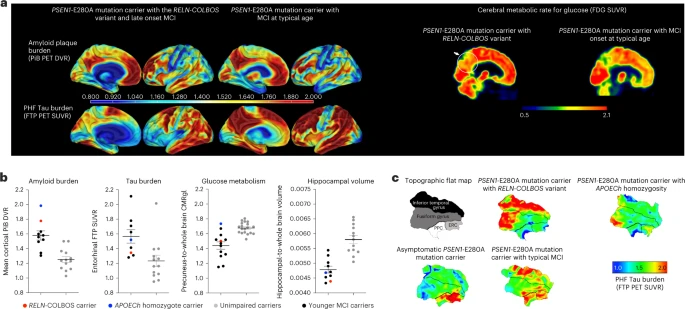Uncovering Resilience to Alzheimer's Disease
A recent publication highlights the discovery of the second case demonstrating exceptional resilience to autosomal dominant Alzheimer's disease (ADAD). This male patient, carrying a PSEN1-E280A mutation, remained cognitively intact until the age of 67, despite the presence of highly elevated amyloid plaque burden. Interestingly, the patient did not possess the protective APOE3 Christchurch variant but instead had a rare variant in the RELN gene (H3447R), termed COLBOS. This gain-of-function variant showed enhanced ability to activate its protein target Dab1, leading to reduced human Tau phosphorylation. These findings suggest a potential role for RELN signaling in resilience to dementia, highlighting the importance of genetic variants in ADAD protection.
The apolipoprotein E (APOE) gene, specifically the APOE ε4 allele, is the most well-established genetic risk factor for late-onset Alzheimer's disease. Inheriting one or two copies of the APOE ε4 allele increases the risk of developing Alzheimer's and may influence the age of onset.
According to a more recent study, the double copy of APOE4 should be recognized not only as a risk factor but also as a cause for distinct genetic form of Alzheimer’s. It affects between 2% and 3% of the entire Caucasian population. Besides APOE genes (that could be fixed by gene therapy), the protective effect against Alzheimer's disease concentrated on the alleles in/near ANKH, GRN, TMEM106B, SORT1, PLCG2, and RIN3 genes that provided up to >5-fold lower polygenic risk score in centenarians compared to AD cases (P = 7.69 × 10-71), and 2-fold lower compared to age-matched controls (P = 5.83 × 10-17).
Other genes, such as the presenilin 1 (PSEN1) and presenilin 2 (PSEN2) genes, have been linked to early-onset familial Alzheimer's disease, which is a rare form of the condition that runs in families. However, it's important to note that having these genetic risk factors doesn't guarantee the development of Alzheimer's, and many other factors, including lifestyle and environmental factors, also play a role in the disease.
Mutations in the PSEN1 gene are associated with early-onset familial Alzheimer's disease, which is a rare form of the condition that tends to run in families. Presenilin 1. The PSEN1 gene codes for a crucial component of the gamma-secretase enzyme complex. This enzyme plays a role in the processing and production of beta-amyloid, a protein fragment that forms plaques in the brains of individuals with Alzheimer's disease. Mutations in the PSEN1 gene, E280A in particular, can lead to the production of abnormal presenilin 1 protein, which in turn can disrupt the normal processing of beta-amyloid and contribute to the development of early-onset familial Alzheimer's disease.
REFERENCES
Lopera, F., Marino, C., Chandrahas, A.S. et al. Resilience to autosomal dominant Alzheimer’s disease in a Reelin-COLBOS heterozygous man. Nat Med (2023). https://doi.org/10.1038/s41591-023-02318-3
Tesi N, van der Lee S, Hulsman M, van Schoor NM, Huisman M, Pijnenburg Y, van der Flier WM, Reinders M, Holstege H. Cognitively healthy centenarians are genetically protected against Alzheimer's disease. Alzheimers Dement. 2024 Apr 18. doi: 10.1002/alz.13810. Epub ahead of print. PMID: 38634500.




Comments
Post a Comment